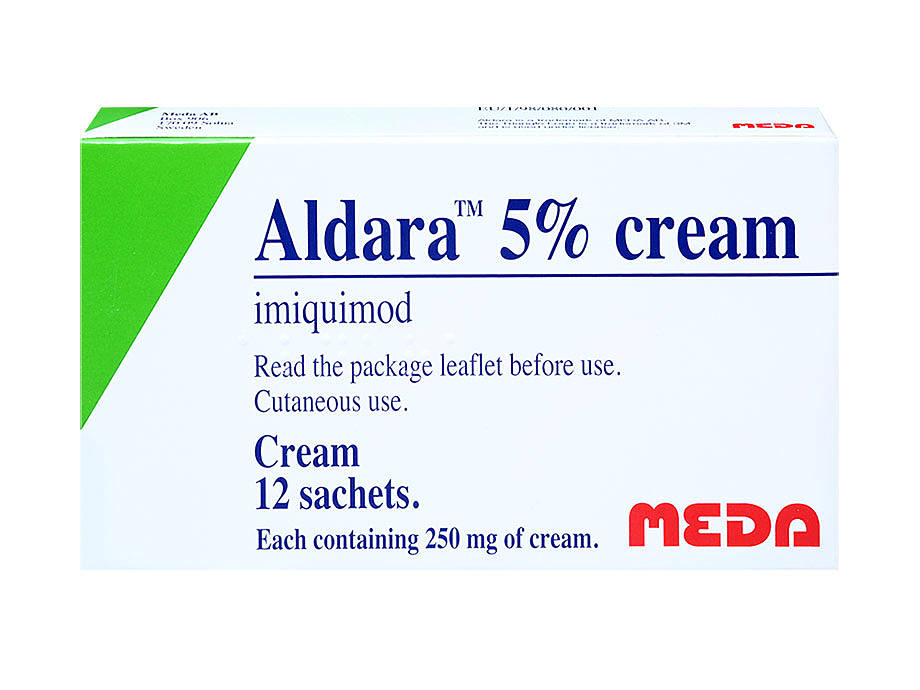Aldara
Help your immune system fight genital warts with Aldara cream.


Aldara is a cream used to treat genital warts. The active ingredient of Aldara 5% cream is imiquimod. Each 250mg sachet of cream contains 12.5g of imiquimod.
Each box of Aldara contains either 12 or 24 sachets of cream.
You can choose to have the paper prescription delivered to your home or to your local pharmacy, where you can collect the medication. Alternatively, you can also choose to have your medication delivered directly to your door.
Aldara is manufactured by 3M Healthcare Ltd.



About Aldara
What is Aldara?
Aldara is a cream used to treat genital warts.
Genital warts are caused by the human papilloma virus (HPV). The warts can appear anywhere on your genitals and around the anus.
Genital warts are skin coloured growths and are usually painless. If you leave it untreated, genital warts can form cauliflower-like clusters. The warts are not generally itchy or painful, but can become like that if you leave them untreated for a long time.
The virus is spread by close sexual contact. Genital warts can affect you whether you’re a man or woman. They are particularly common if you are sexually active. If you think you have genital warts, you should avoid having sex before you are completely treated.
Aldara is used to treat warts that are on the skin around the genitals and anus. It should not be used for warts that are inside the body.
Aldara, also known as imiquimod cream, is also used to treat other skin conditions. These include superficial basal cell carcinoma (SBCC), a type of skin cancer, and actinic keratosis.
How to use Aldara
You should apply Aldara cream 3 times a week. The most common way to do this is to apply the cream on Monday, Wednesday, and Friday.
The most convenient time to apply Aldara is usually just before bed. Aldara needs to be left on the skin for 6 to 10 hours. You should avoid having a bath or shower during this time.
Make sure you wash your hands thoroughly before and after applying Aldara cream.
To apply Aldara:
- wash the area to be treated with gentle soap and warm water
- dry thoroughly
- squeeze some cream from the sachet onto your finger
- apply a thin layer of cream on to the area to be treated
- rub gently into the skin until the cream has disappeared
- throw away the open sachet
- after 6 to 10 hours, wash the area where the cream was applied with gentle soap and water
Each sachet is single use and should be thrown away after an application. You should not reuse sachets after they have been opened.
You should apply Aldara only once a day. If you have missed a dose of Aldara, apply it as soon as you remember and continue your normal schedule.
If you are a man with genital warts under your foreskin, pull the foreskin back each day and wash underneath it. This will help prevent the foreskin becoming tight and swelling. If you find it difficult to pull your foreskin back, stop using Aldara cream and speak to your doctor immediately.
Aldara cream may damage condoms and diaphragms. You should use Aldara cream after, not before, sexual activity.
You should continue using Aldara cream until your warts have completely disappeared.
Aldara cream should not be used for longer than 16 weeks. If you have been using Aldara for 16 weeks and your warts have not disappeared, speak to your doctor.
Do not use Aldara internally, including in the urethra (the tube where you pee), the vagina, cervix or inside your anus.
If Aldara gets into your eyes, lips or nostrils rinse immediately with water.
Do not swallow Aldara. If this happens, contact your emergency department immediately.
How does Aldara work?
Aldara works by helping your body fight the virus that causes genital warts. The active ingredient imiquimod is known as an immune response modifier.
Aldara does not attack the HPV virus directly. Instead, imiquimod stimulates your immune cells to attack the virus. This includes producing proteins called cytokines which helps your body clear genital warts.
How effective is Aldara?
Aldara is effective in treating genital warts, and you should see your symptoms disappear within 3 months of consistent use.
You may see your genital warts disappear in as little as 4 weeks. However, most women using Aldara will see their genital warts disappear in around 8 weeks. And most men using Aldara will see their genital warts disappear in around 12 weeks.
Avoid washing the affected area after you have applied the cream as this can stop it from being absorbed into your skin. And always follow the course of treatment your doctor prescribes.
What are the side effects of Aldara?
You may experience some side effects when using Aldara but these are usually mild and temporary.
You might notice some effects of Aldara on the area where you have applied the cream. These should clear up within 2 weeks of stopping treatment.
Very common side effects of Aldara cream are:
- redness of the skin
- wearing away of the skin, flakiness or swelling
- hardening under the skin, small open sores, or a crust that forms as the skin heals (scabbing)
- small bubbles under the skin
- itching, burning or pain
Getting a headache is a common side effect of Aldara. You can treat this with over the counter painkillers if you are able to take them.
The uncommon side effects of Aldara include:
- flu-like symptoms
- increased sweating
- ringing in the ears
- flushing
- tiredness
- dizziness
- migraine
- pins and needles
- difficulty sleeping
- loss of appetite
- swollen glands
- vaginal infections including thrush
- erection problems
- cough and colds with a sore throat
You can find further information about side effects by reading the patient information leaflet.
If you are concerned about any side effects, speak to your doctor or pharmacist. You should also talk to your doctor if you feel that Aldara is too strong or too weak.
Who can use Aldara?
Aldara is suitable for both men and women with genital warts on the surface of the genitals or anus. Aldara cream is only suitable for external genital warts and should not be used internally.
You should not use Aldara cream if you are:
- breastfeeding
- under 18 years old
- have a positive HIV status
Speak to your doctor if you are pregnant or think you might be pregnant before using Aldara cream.
Aldara interactions
There are no known interactions between Aldara and other medicines or foods.
If you are taking medications that suppress your immune system, speak to your doctor before using Aldara.
Alternative treatments
There are other treatments available to treat genital warts such as Condyline which is available from ZAVA.
If topical treatment is not working for you, your doctor may offer surgery. During surgery, genital warts can be cut or burned off.
You may also be offered treatment to freeze the genital warts. Sometimes you’ll need multiple sessions for the treatment to be successful.
You can also take some self care steps to make sure you get the best out of your treatment.
These include:
- avoiding perfumed soap or bath products
- avoid using vaginal products such as douches, deodorants or soaps as this can irritate the area
- quit smoking or try to cut down as smoking can slow down how quickly your body heals
- always use a condom if you have sex, but try to avoid having sex until the genital warts disappear
There is no complete cure to genital warts. Using appropriate treatment can help your body fight against the virus and eventually heal on its own.
Can Aldara be used for more than one episode of genital warts?
Aldara can clear an episode of genital warts, but it does not get rid of the HPV virus. After successful treatment with Aldara, you may experience another episode of genital warts.
If this happens, you may be able to use Aldara again. Fill out our online questionnaire or speak to your doctor about what treatment is suitable for you.

Babak studied medicine at King’s College London and graduated in 2003, having also gained a bachelor’s degree in Physiology during his time there. He completed his general practice (GP) training in East London, where he worked for a number of years as a partner at a large inner-city GP practice. He completed the Royal College of GPs membership exam in 2007.
Meet our doctorsLast reviewed: 07 Sep 2022
-
Imiquimod cream Patient Information Leaflet (PIL) (British Association of Dermatologists) [Dec 2021] [accessed Jan 2022]
-
Aldara 5% cream Patient Information Leaflet (PIL) [March 2017] [accessed Jan 2022]
-
Imiquimod cream (Patient) [Jul 2020] [accessed Jan 2022]
-
Genital warts (NHS) [Aug 2020] [accessed Feb 2022]
